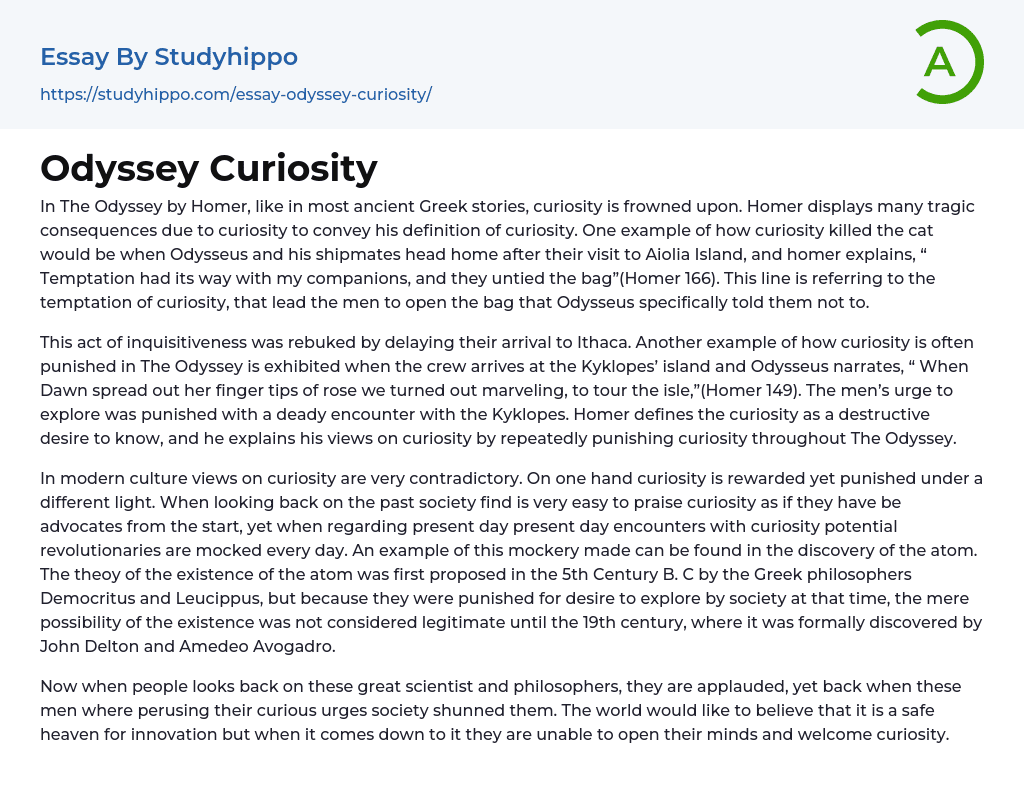In The Odyssey by Homer, like in most ancient Greek stories, curiosity is frowned upon. Homer displays many tragic consequences due to curiosity to convey his definition of curiosity. One example of how curiosity killed the cat would be when Odysseus and his shipmates head home after their visit to Aiolia Island, and homer explains, “ Temptation had its way with my companions, and they untied the bag”(Homer 166). This line is referring to the temptation of curiosity, that lead the men to open the bag that Odysseus specifically told them not to.
This act of inquisitiveness was rebuked by delaying their arrival to Ithaca. Another example of how curiosity is often punished in The Odyssey is exhibited when the crew arrives at the Kyklopes’ island and Odysseus narrates, “ When Dawn
...spread out her finger tips of rose we turned out marveling, to tour the isle,”(Homer 149). The men’s urge to explore was punished with a deady encounter with the Kyklopes. Homer defines the curiosity as a destructive desire to know, and he explains his views on curiosity by repeatedly punishing curiosity throughout The Odyssey.
In modern culture views on curiosity are very contradictory. On one hand curiosity is rewarded yet punished under a different light. When looking back on the past society find is very easy to praise curiosity as if they have be advocates from the start, yet when regarding present day present day encounters with curiosity potential revolutionaries are mocked every day. An example of this mockery made can be found in the discovery of the atom. The theoy of the existence of the atom was firs
proposed in the 5th Century B. C by the Greek philosophers Democritus and Leucippus, but because they were punished for desire to explore by society at that time, the mere possibility of the existence was not considered legitimate until the 19th century, where it was formally discovered by John Delton and Amedeo Avogadro.
Now when people looks back on these great scientist and philosophers, they are applauded, yet back when these men where perusing their curious urges society shunned them. The world would like to believe that it is a safe heaven for innovation but when it comes down to it they are unable to open their minds and welcome curiosity.
- Aldous Huxley essays
- Alice Walker essays
- Amy tan essays
- Anne Bradstreet essays
- Anton Chekhov essays
- Arthur Miller essays
- Augustine essays
- Bertolt Brecht essays
- Booker T Washington essays
- Carol ann duffy essays
- Charles Dickens essays
- Charlotte Perkins Gilman essays
- Chinua Achebe essays
- Christina Rossetti essays
- Consider The Lobster essays
- Edgar Allan Poe essays
- Elizabeth Bishop essays
- Emily Dickinson essays
- Ernest Hemingway essays
- F. Scott Fitzgerald essays
- George Orwell essays
- Harper Lee essays
- Homer essays
- James Baldwin essays
- Jane Austen essays
- John Donne essays
- John Steinbeck essays
- Kate Chopin essays
- Kurt Vonnegut essays
- Langston Hughes essays
- Leonardo Da Vinci essays
- Mark Twain essays
- Mary Shelley essays
- Maya Angelou essays
- Nathaniel Hawthorne essays
- Oscar Wilde essays
- Percy Bysshe Shelley essays
- Peter Skrzynecki essays
- Phillis Wheatley essays
- Poets essays
- Ralph Waldo Emerson essays
- Ray Bradbury essays
- Richard Rodriguez essays
- Robert Browning essays
- Robert Frost essays
- Robert Louis Stevenson essays
- Seamus Heaney essays
- Sherman Alexie essays
- Sophocles essays
- Stephen King essays




